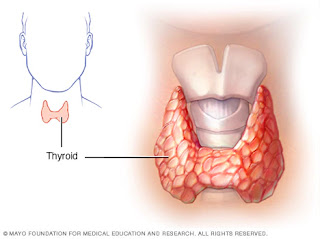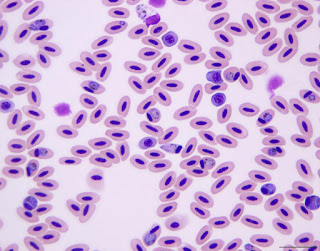Hypothyroidism
Hypothyroidism
Definition
Hypothyroidism – also called underactive thyroid – is the most common thyroid disorder. It happens when your thyroid gland doesn’t produce enough thyroid hormone, which is essential because thyroid hormone helps regulate important body processes, such as your metabolism. But with low thyroid function, these body processes slow down.
Pathophysiology
The hormones produced by the thyroid gland are T3 and T4. These hormones have an action on almost all parts of the body. The secretion of these hormones is regulated by TSH or thyroid stimulating hormone that is secreted by the pituitary gland. The secretion of thyroid hormone occurs only from this particular gland. The presence of iodine and amino acid tyrosine are a must for the production of thyroid hormones. Hypothyroidism and low levels of the thyroid hormones can occur if there is a deficiency of iodine for thyroid or thyroid stimulating hormone (TSH).
The hypothalamus of the brain secretes TRH thyroid releasing hormone which acts on the pituitary gland and initiates the release of TSH or thyroid stimulating hormone. TSH then acts directly on the thyroid gland to release thyroid hormones T3 and T4. The normal functioning of the thyroid (healthy thyroid) is regulated by negative feedback mechanism where the levels of thyroid hormones increase or decrease under the influence of TSH.
Causes
- Hashimoto’s thyroiditis: This autoimmune disease is the most common cause of hypothyroidism.
- Medications: Certain medications, such as lithium, can cause hypothyroidism.
- Pregnancy: Hypothyroidism can develop during or after pregnancy.
- Treatment for hyperthyroidism: People who have hyperthyroidism (overactive thyroid) are treated with radioactive iodine therapy, which impairs thyroid function and can cause hypothyroidism.
- Thyroid surgery: If your thyroid gland is removed, you can’t make thyroid hormone, so you’ll need to take thyroid hormone replacement.
- Radiation therapy: Radiation used for the treatment of cancer in the head or neck, lymphoma, or leukemia, may slow or halt the production of thyroid hormone. This will almost always lead to hypothyroidism.
Risk factors
- There are two main factors to consider – age and sex. The chances of being hypothyroid increase with age, and they are greater if an individual is a woman.
- You have a family history of thyroid disease or any autoimmune disease
- You have type 1 diabetes or rheumatoid arthritis, or other autoimmune disorders
- As mentioned in the causes section medications and thyroid surgery also a major risk factors
Signs and Symptoms in adults
Women who are over age 60, as well as men who are aging, should look out for these potential symptoms of hypothyroidism:
- Weight gain
- Fatigue
- Sensitivity to cold temperatures
- Depression
- Dry skin
- Thinning hair
- Heavy menstrual periods (in women)
- Trouble sleeping
- Difficulty concentrating
- Pain or swelling of the joints
- Constipation
- High cholesterol levels
- Muscle weakness
Signs and symptoms in Children and teen
Symptoms of hypothyroidism in children and teens are similar to symptoms in adults and can include:
- Poor growth or short stature
- Delayed puberty
- Slow reaction time
- Weight gain
- Coarse, dry hair or skin
- Muscle cramps
- Delayed mental development
- Increased menstrual flow for girls
Signs and Symptoms in Infants
Symptoms of hypothyroidism in infants may include:
- Jaundice (yellowing of the skin and whites of the eyes)
- Frequent choking
- Puffy face
- Constipation
Complications
- Heart disease and stroke
- Hypothyroidism can lead to insulin resistance
- The myxedema coma
- Goiter
- Mental health issues
- Peripheral neuropathy
- Low levels of thyroid hormone can interfere with ovulation, which impairs fertility
- Birth defects
Diagnosis and test
Medical evaluation
Your doctor will complete a thorough physical exam and medical history. They’ll check for physical signs of hypothyroidism, including:
- Dry skin
- Slowed reflexes
- Swelling
- A slower heart rate
In addition, your doctor will ask you to report any symptoms you’ve been experiencing, such as fatigue, depression, constipation, or feeling constantly cold.
Blood test
There are several types of blood tests – the most definitive one is called the TSH test (thyroid-stimulating hormone). However, in some cases, physicians may refer to the free thyroxine or T4, free T4 index, or total T4 to aid in the diagnosis.
TSH Test
A thyroid-stimulating hormone or TSH is a blood test that measures the amount of T4 (thyroxine) that the thyroid is being signaled to make. If you have an abnormally high level of TSH, it could mean you have hypothyroidism. 0.4 mU/L to 4.0 mU/L is considered the reference range (there may be a slight variation depending on the laboratory), TSH >4.0/mU/L with a low T4 level indicates hypothyroidism.
T4 (thyroxine) Test
The thyroid gland produces T4 (thyroxine). The free T4 and the free T4 index are blood tests that, in combination with a TSH test, can let your physician know how your thyroid is functioning.
Anti-thyroid Microsomal Antibodies Testing
A third hypothyroid test is for anti-thyroid microsomal antibodies—anti-thyroid peroxidase (anti-TPO). These antibodies, which are produced by the immune system, may attack thyroid cells. If a blood test determines their presence, it shows that there has been thyroid damage which could potentially lead to hypothyroidism.
Differentiation of Hypothyroidism
Primary hypothyroidism
Primary hypothyroidism is due to disease in the thyroid; thyroid-stimulating hormone (TSH) is increased. The most common cause is autoimmune. It usually results from Hashimoto thyroiditis and is often associated with a firm goiter or, later in the disease process, with a shrunken fibrotic thyroid with little or no function. The 2nd most common cause is post-therapeutic hypothyroidism, especially after radioactive iodine therapy or surgery for hyperthyroidism or goiter.
Secondary hypothyroidism
Secondary hypothyroidism occurs when the hypothalamus produces an insufficient thyrotropin-releasing hormone (TRH) or the pituitary produces insufficient TSH. Sometimes, deficient TSH secretion due to deficient TRH secretion is termed tertiary hypothyroidism.
Subclinical hypothyroidism
Subclinical hypothyroidism is elevated serum TSH in patients with absent or minimal symptoms of hypothyroidism and normal serum levels of free T4. Subclinical thyroid dysfunction is relatively common; it occurs in more than 15% of elderly women and 10% of elderly men, particularly in those with underlying Hashimoto thyroiditis.
Treatment and medication
Medications
Hypothyroidism is a lifelong condition. For many people, medication reduces or alleviates symptoms.
- Hypothyroidism is best treated by using levothyroxine (Levothroid, Levoxyl). This synthetic version of the T4 hormone copies the action of the thyroid hormone your body would normally produce. The medication is designed to return adequate levels of thyroid hormone to your blood. Once hormone levels are restored, symptoms of the condition are likely to disappear or at least become much more manageable.
- Animal extracts that contain thyroid hormone are available. These extracts come from the thyroid glands of pigs. They contain both T4 and triiodothyronine (T3). If you take levothyroxine, you’re only receiving T4. But that’s all you need because your body is capable of producing T3 from the synthetic T4. These alternative animal extracts are often unreliable in dosing and haven’t been shown in studies to be better than levothyroxine. For these reasons, they aren’t routinely recommended.
Thyroid Hormone Replacement Therapy
The main goal is to compensate for the lack of hormone secreted by the thyroid gland. In most cases, an affected individual will take a daily dose of T4 (or T3 and T4) in a pill taken orally. But it’s important to understand that every patient’s therapy may be different.
There is no cookie-cutter dosage or treatment plan when it comes to thyroid hormone replacement therapy. How the body absorbs the hormones, along with the number of hormones needed to help the body function properly is very varied.
Prevention
- Taking iodine supplements can prevent hypothyroidism.
- Exercises and alternative therapies may prove more than effective in minimizing symptoms of thyroid imbalance than traditional treatments.
- Get a screening test every five years if you are 50 years old or older.
- Get regular screenings if you:
- Have Type 1 diabetes
- Have infertility (females)
- Take certain medications
Natural remedies
- Do not use non-stick cookware
- Eliminate Soy: Soy restrains functions of the thyroid, imbalances hormones & it has been appeared to cause goiters
- Balance Estrogen Levels: Excessive consumption of estrogen slows down the thyroid organ. This implies disposing of anti-conception medication, expanding the fiber in the eating routine & keeping away from all non- organic meats.
- Adhere to an Alkaline Diet: This is greatly useful when curing any severe issue.
- Exercise: Find a physical movement activity that is fun & does it regularly.
- Iodine: The thyroid requires iodine to work appropriately & loads of individuals now experience the ill effects of iodine lacks. To test yourself, put some iodine on your stomach. In case it vanishes in 12 hours, at that point you are lacking iodine. Continue including iodine in increased amounts, until it doesn’t vanish in a 12-14 hours’ time. This works because of the way that the body trans-dermally absorbs iodine at the rate at which it is required.
- Avoid all types of fluoride
- Move for natural diet: To enable the body to recuperate itself, take away the loads on its immune system. This implies every single processed food, synthetic flavors, hues, additives, white sugar, white flour, table salt, hydrogenated oils, aluminum and etc. ought to be removed from the diet chart. Organic food is perfect.
- Chlorophyll: Including chlorophyll gives fundamental copper, oxygenates the body, adds healthy RBC’s, and in general helps with skin health. Chlorophyll is a safe strategy for the oral supplement of copper.
- Pears and Apples: Pears help most when combined with or mixed with apple juice. Try this pear juice formula, and drink it routinely.
- Zinc and Selenium: Studies demonstrate that serious zinc or selenium insufficiencies would cause diminished thyroid levels. Never take zinc first thing in the stomach. Brazil nuts are high in both zinc and selenium.
- Coconut Oil: Buy natural, fresh squeezed, coconut oil from a health store. Take around 1 teaspoon every day. You can likewise use it in cooking, yet be cautioned that it smokes at low cooking temperatures, so it should just be utilized for low-warm cooking. Coconut oil speeds up the digestion improve thyroid hormone generation and cut down candida yeast.
- Avoid Canola Oil: Canola oil meddles with the generation of thyroid hormones, among its numerous risks. Treat canola oil like the evil, genetically engineered hereditarily designed poison.




Comments
Post a Comment